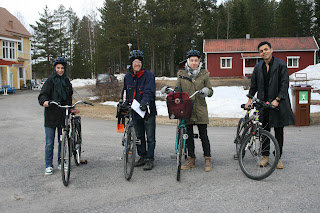Meal and community

For the authors of the Gospels (however much did they disagree with each other) and the early Christian communities (however different they were), the shared meal was at the centre. The major change happened in the understanding of the nature of God and his presence - God moved (to overgeneralize) from the temple setting to the setting of a common meal. As we read from the Gospels and NT scholars, Jesus himself saw the importance of meals together and praying together with his disciples. And the breaking of bread was the most intuitive ritual to express the simplicity of God and communion. The author of the 4th Gospel writes: Jesus says to eat the flesh and drink the blood of a "Son of Man"(a Semitic phrase meaning human, person, man), probably meaning to accept and take him as a person, accept God through him as a normal human being. Our ancestors ate manna from heaven (a miraculous act of God, who still maintains the distance between him and humanity) and died. But through Jesus God no longer keeps a distance but takes on bodily form, saying - I am the true bread.
God is the reality which touches us on different levels: nature, art, and others. Living in our small "me" is not real. Reality is bigger. Others can become a reality channel for us. Living in Sundet and sharing meals (something we all are equal in and have the need for) is exactly this experience. The meals we share are at the centre of our relations (Satar, Mamaloo, Elizabeth, Rut, Josh, Benjamin, Valeria, Alicia, Malin, et al.). We are different in all possible ways, but this is what creates space for growth, dialogue, and friendship. Everything that happens in our lives continues at the table: either we share it with others, keep silent about the things we endure, or notice someone's challenges... In any way, we meet Otherness that we could otherwise miss during the day. It is not meant in an idealistic way, like people who eat together will inevitably bear each other's lives, but it opens space for Otherness, which heals us directly or indirectly. To connect it to the topic of this week's Monday reflection: the dinner table is the Enneagram circle, which Richard Rohr calls "the face of God". The healing comes from seeing the bigger picture.
On Tuesdays and Thursdays, the Reality comes with the people from the margins whom we serve, eat, and talk with. We share our lives, are they broken or not yet. We come to see the Reality in the union of the opposites. Those meals break our social barriers to some extent. The change is sometimes invisible (only inner and spiritual), sometimes visible (as a result of help). We serve, and we are served. On Fridays, we meet youth. Having fika and talking about faith and this moment in our spiritual journey (what we did last Friday) is another way to open Reality for ourselves. Meeting people who may go through similar experiences as ours give us strength and enables us to see life from a higher place than our small ego.
The church and a healthy community welcome guests. Hospitality goes together with spirituality in all of the world's religions. In the Jewish Bible, we find different forms of being hospitable towards the neighbour. It is one of the central parts of all the commandments from the Torah. The truth is we don't always play the role of a host or a guest. It changes. The true community sees the interchangeability of those roles. Some guests give us more than we give them. The church has space for those who come for food or clothes and those who don't have such needs but would like to share community, join the worship band, or share their spiritual experience. Paul writes this in his letters on how the church should live. He writes that we should respect all our differences in needs, abilities, and gifts but not put them as barriers. Instead, to see the face of God in them, as in the Enneagram. So the community has to be a space open to be filled with the potential of a stranger from inside or outside. We strive towards a stable space where the Event can happen anytime. For a space we can create, but the Event we give over to what the Church called the Holy Spirit.
Maksym Kinash






Comments
Post a Comment